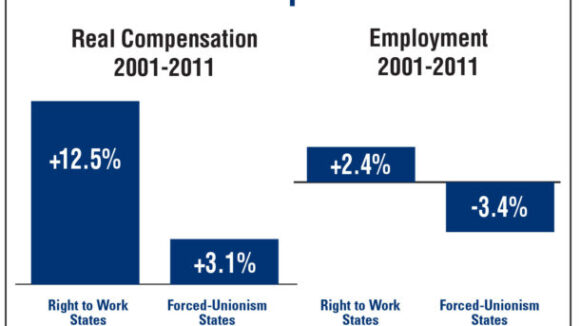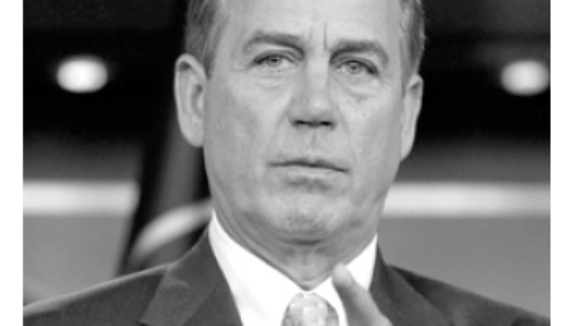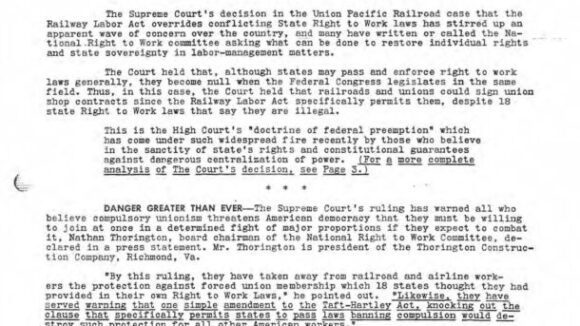IAM Union Faces Backlash for Forcing Union Dues for Politics
Foundation attorneys argue IAM union “opt-out” requirement to escape payment for union officials’ political activities violates Supreme Court’s Janus standard

Foundation attorneys argue IAM union “opt-out” requirement to escape payment for union officials’ political activities violates Supreme Court’s Janus standard

Capitol Hill Sponsorship Reached 127 Before Thanksgiving Recess (source: National Right to Work December 2015 Newsletter) Thanks to relentless grass-roots activism by members of the National Right to Work Committee, the number of congressional cosponsors of the forced-dues repeal…

Pro-Forced Dues Federal Policy Harms Employees, Firms Nationwide (Source: February 2015 National Right to Work Committee Newsletter) Last month, U.S. Rep. Steve King (R-Iowa) and 76 original cosponsors introduced legislation on Capitol…

Compulsory Unionism Negatively Correlated With Compensation Growth (source: National Right To Work Committee April 2012 Newsletter) By prohibiting compulsory union dues, state Right to Work laws spur the growth of private-sector employee compensation in the form of wages, salaries, benefits and bonuses, as well as employment growth. Last month, the U.S. Commerce Department's Bureau of Economic Analysis (BEA) issued its estimates for 2011 state personal income. The BEA also issued estimates for an array of specific kinds of income, including employee compensation, at the state level. The 2011 BEA income data in general, and the compensation data especially, show once again that there is a strong negative correlation between compulsory unionism and economic growth. Overall, private-sector employee compensation (including wages, salaries, benefits and bonuses) grew by 6.4% nationwide over the past decade, after adjusting for inflation. Historically speaking, this was slow growth. However, states that protect employees from being fired for refusal to pay dues or fees to an unwanted union typically fared far better than the rest. (From 2001 to 2011, 22 states had Right to Work laws prohibiting forced union dues on the books. Last month Indiana became the 23rd Right to Work state.) A review of how compensation and jobs grew (or failed to grow) in each state suggests the U.S. Congress could dramatically improve America's economic prospects for the next decade by repealing forced union dues and fees nationwide. Current federal law authorizes and promotes the payment of compulsory union dues and fees as condition of getting or keeping a job. Right to Work States' 2001-2011 Compensation Increase Nearly Double the National Average

Compulsory Unionism Negatively Correlated With Compensation Growth (source: National Right To Work Committee April 2012 Newsletter) By prohibiting compulsory union dues, state Right to Work laws spur the growth of private-sector employee compensation in the form of wages, salaries, benefits and bonuses, as well as employment growth. Last month, the U.S. Commerce Department's Bureau of Economic Analysis (BEA) issued its estimates for 2011 state personal income. The BEA also issued estimates for an array of specific kinds of income, including employee compensation, at the state level. The 2011 BEA income data in general, and the compensation data especially, show once again that there is a strong negative correlation between compulsory unionism and economic growth. Overall, private-sector employee compensation (including wages, salaries, benefits and bonuses) grew by 6.4% nationwide over the past decade, after adjusting for inflation. Historically speaking, this was slow growth. However, states that protect employees from being fired for refusal to pay dues or fees to an unwanted union typically fared far better than the rest. (From 2001 to 2011, 22 states had Right to Work laws prohibiting forced union dues on the books. Last month Indiana became the 23rd Right to Work state.) A review of how compensation and jobs grew (or failed to grow) in each state suggests the U.S. Congress could dramatically improve America's economic prospects for the next decade by repealing forced union dues and fees nationwide. Current federal law authorizes and promotes the payment of compulsory union dues and fees as condition of getting or keeping a job. Right to Work States' 2001-2011 Compensation Increase Nearly Double the National Average

Private-Sector Employees and Employers Alike Reap Major Benefits (Source: July 2011 NRTWC Newsletter) Today, American employees and employers across the country are working hard and using their ingenuity to help their businesses recover from the severe 2008-2009 recession. Unfortunately, an array of laws and regulations imposed by the U.S. Congress and federal bureaucrats are hindering the efforts of workers, managers, and business owners. And the federal policies that authorize the firing of roughly 6.3 million private-sector employees should they refuse to pay union dues or fees as a job condition are among the very worst, if not the worst, obstacles to economic recovery. One indication of the damage wrought by the pro-forced unionism provisions in the National Labor Relations Act (NLRA) and the Railway Labor Act (RLA) is the state-by-state gross domestic product (GDP) data reported by the U.S. Commerce Department's Bureau of Economic Analysis. According to BEA data, from 2000 to 2010, the combined real output of the 22 states with Right to Work laws protecting employees from the forced-union-dues provisions in the NLRA grew by 21.8%. That percentage gain is well over half again as large as the combined real 2000-2010 growth of the 28 states that still do not protect employees from forced union dues. To put it another way, had the entire country grown by as much as current Right to Work states did over just this ten-year period, by 2010 our national GDP would have been $13.674 trillion in constant, "chained" 2005 dollars, roughly $575 billion above the actual figure. Forced Dues Not Justified, Morally or Economically
President Obama's overarching labor policy seems to be, "The more union monopoly bargaining, the better." Credit: L.A. Times (Source: June 2010 NRTWC Newsletter) Right to Work Fights For Independent Transportation Employees Over the past three-quarters of a century, federal labor policy has done enormous damage to employees and businesses by authorizing and promoting monopolistic unionism. Federally-imposed "exclusive" union bargaining undermines efficiency and productivity by forcing employers to reward equally their most productive and least productive employees. The damage is compounded when the employees already hurt by being forced to accept a union bargaining agent opposed to their interests are forced as well to pay dues or fees to the unwanted union. Fortunately, Right to Work laws in 22 states, where nearly 40% of the private-sector work force is employed, prohibit the collection of forced dues from the vast majority of employees. (Both the U.S. Supreme Court and the U.S. Congress have recognized states' freedom to protect employees' Right to Work.) However, in 1951, when Congress first foisted forced union dues and fees on employees covered by the Railway Labor Act (RLA), Big Labor senators and representatives opted to deny states the option to protect employees' Right to Work. Ever since, Big Labor has had the government-granted power to get airline and railroad employees fired for refusal to bankroll a union in all 50 states, including Right to Work states.
The old saying, “you get what you paid for” could not be truer when it comes to the Obama Administration. After spending nearly a $1 billion to get the president elected, the unions are now getting a return on their…

Go here to read the May/June 1956 National Right To Work Newsletter.